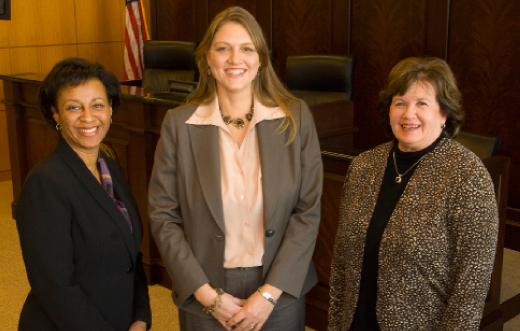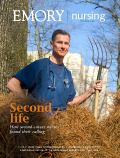Legal eagles

Debra Meadows, Hope Bussenius, and Dianne Collier, standing in a mock courtroom at King & Spalding in Atlanta, say legal nurse consulting is a growing field, in part because of the development of a national association.
Transitioning from clinical to law firms, nurses find a niche.
On the 36th floor of an Atlanta law firm, down a hallway flanked by shiny marble floors and walls adorned with art, a handful of nurses are going through stacks of medical records. They read, analyze, and then they write their summaries for attorneys.
They are legal nurse consultants (LNCs), a niche within nursing that has been gaining traction since the late 1980s, when the American Association of Legal Nurse Consultants was formed. They help orient attorneys to any medical aspects of a case—medical terminology, pharmacology, standards of care, to name a few. Most of their work involves requesting and looking at medical records. The LNC then has to piece together a patient’s medical history, symptoms, and treatments. They render written opinions ranging from whether a drug could cause a certain reaction to the appropriateness of care received by a patient.
More experienced LNCs accompany attorneys to trial. They work with medical experts on their testimony, alert attorneys to contradictions in medical testimony, prepare multimedia exhibits to help explain concepts to the jury, and draft questions for the lawyer to ask a medical witness.
“Nurses have long been patient advocates, but in working in defense litigation, we often are on the other side as advocates for our clients,” says Dianne Collier 76MN, an LNC for 25 years and former School of Nursing faculty member.
|
If you want day-to-day interaction with patients, this is not for you because most of what we do is review, analyze, and summarize documents for the attorneys. --Debra Meadows 99N |
||||
Collier and two other Emory nursing school alums, Debra Meadows 99N and Hope Bussenius 93MN, work in the Atlanta office of King & Spalding, where they handle a range of cases involving product and medical device liability, pharmaceuticals, and malpractice. A large law firm like King & Spalding, which employs seven LNCs, looks for candidates with a master’s degree and more than five years of varied clinical experience.
Though Bussenius wanted to transition away from full-time clinical care when she became an LNC, adjusting to the change of workplace culture took some time. “You’re not running the show at a law firm like you would as a family nurse practitioner,” she says. “But the clinical and law firm role are similar in that you educate the attorney as you would the patient.”
Meadows adds, “If you want day-to-day interaction with patients, this is not for you because most of what we do is review, analyze, and summarize documents for the attorneys. You have to be self-driven. You deal with a lot of deadlines. Sometimes you will handle 20 to 30 cases at one time, so this is not for the faint-of-heart. You have to analyze a lot of information very quickly and precisely.”
New LNCs should look toward a small law firm to gain experience. Collier says when she first started, “legal nurse consulting wasn’t even a field. There were 22 lawyers at the small firm where I started so I was able to get more hands-on experience than is sometimes possible in larger firms. I was at my first trial within a year and a half, and that’s how I grew in this profession.”


